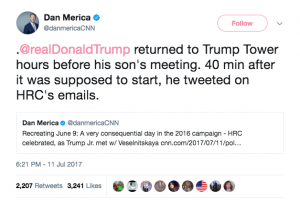- Joined
- Jan 26, 2003
- Messages
- 22,183
From "A Conspiracy of Dunces" in "The New York Times".
Link...https://www.nytimes.com/2017/07/11/...ight-region&WT.nav=opinion-c-col-right-region
"Here is a good rule of thumb for dealing with Donald Trump: Everyone who gives him the benefit of the doubt eventually regrets it.
This was true of clients and contractors and creditors throughout his business career. It was true of the sycophants and opportunists before whom he dangled cabinet appointments during the campaign and then, oh, never mind. It has been true of his cabinet members and spokesmen, whose attempts to defend and explain their boss’s conduct are gleefully undercut by the boss himself. And it should be true — for the sake of their souls, I sincerely hope it’s true — of the Republican leaders whose reputations for probity and principle he has stomped all over since winning their party’s nomination.
And now it’s true of me.
The benefit of the doubt I extended to Trump was limited, but on a rather important subject: I thought that direct collusion between his inner circle and Russian officialdom during the 2016 campaign was relatively unlikely and the odds of ever finding proof of such a conspiracy vanishingly low. A lot of weirdness around Trump and Russia, I argued, had a more normal explanation — he had made business deals with Russians, he still harbors a 1980s-era vision of superpower cooperation, and as a foreign-policy neophyte he clutched the idea of détente like a security blanket even as the Russians separately made moves to help him win.
You can read my argument in full here; it’s a mere six weeks old. It’s also no longer operative, because we know now that Donald Trump’s son, his son-in-law and his campaign manager all took a meeting in which it was explicitly promised that damaging information on Hillary Clinton would be supplied as 'part of Russia and its government’s support for Mr. Trump'.”
AGBF
Link...https://www.nytimes.com/2017/07/11/...ight-region&WT.nav=opinion-c-col-right-region
"Here is a good rule of thumb for dealing with Donald Trump: Everyone who gives him the benefit of the doubt eventually regrets it.
This was true of clients and contractors and creditors throughout his business career. It was true of the sycophants and opportunists before whom he dangled cabinet appointments during the campaign and then, oh, never mind. It has been true of his cabinet members and spokesmen, whose attempts to defend and explain their boss’s conduct are gleefully undercut by the boss himself. And it should be true — for the sake of their souls, I sincerely hope it’s true — of the Republican leaders whose reputations for probity and principle he has stomped all over since winning their party’s nomination.
And now it’s true of me.
The benefit of the doubt I extended to Trump was limited, but on a rather important subject: I thought that direct collusion between his inner circle and Russian officialdom during the 2016 campaign was relatively unlikely and the odds of ever finding proof of such a conspiracy vanishingly low. A lot of weirdness around Trump and Russia, I argued, had a more normal explanation — he had made business deals with Russians, he still harbors a 1980s-era vision of superpower cooperation, and as a foreign-policy neophyte he clutched the idea of détente like a security blanket even as the Russians separately made moves to help him win.
You can read my argument in full here; it’s a mere six weeks old. It’s also no longer operative, because we know now that Donald Trump’s son, his son-in-law and his campaign manager all took a meeting in which it was explicitly promised that damaging information on Hillary Clinton would be supplied as 'part of Russia and its government’s support for Mr. Trump'.”
AGBF




300x240.png)